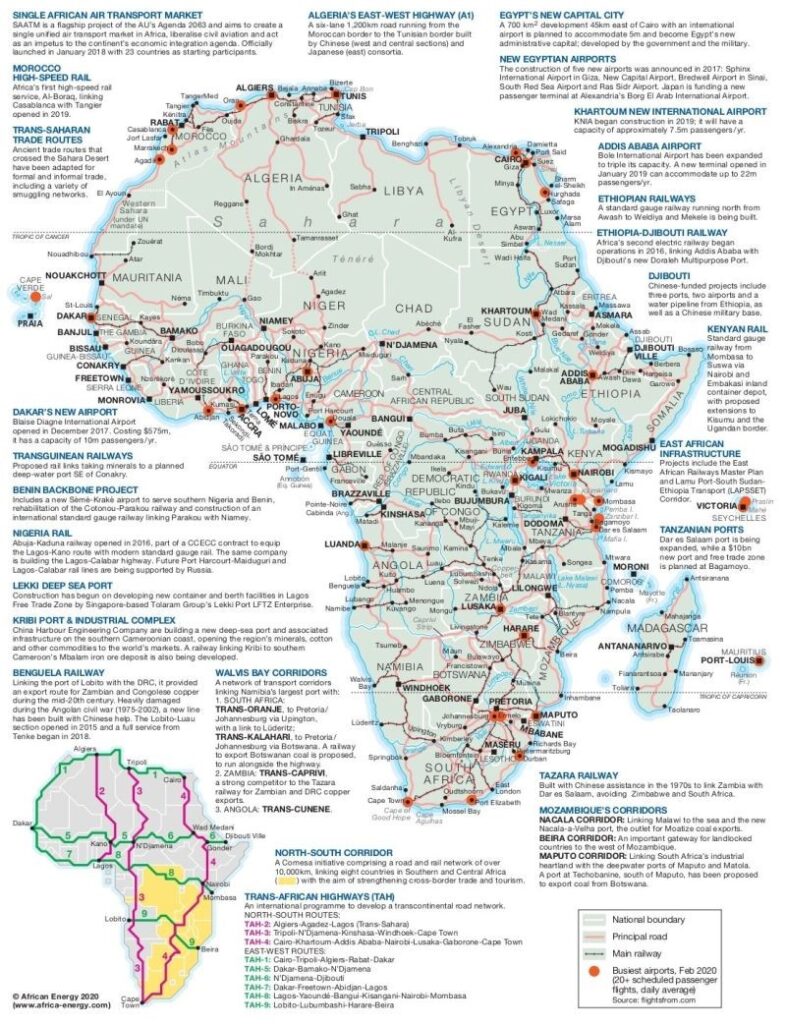Africa is at the forefront of an infrastructure revolution, with transformative projects reshaping the continent’s connectivity, economic dynamics, and social landscapes. Roads, railways, ports, and airports are not just physical links but lifelines for trade, economic growth, and poverty alleviation. This surge in development reflects a shared vision of enhancing intra-African trade, opening up economies, and fostering regional integration.
According to a recent post by JG & Polo Infrastructure, major infrastructure initiatives are paving the way for an interconnected future. Here’s a deeper exploration of these developments and their impacts:

Key Infrastructure Projects and Their Roles
- Road Networks
Africa’s ambitious Trans-African Highway Network (TAH) features nine corridors connecting diverse regions:- Cairo to Cape Town (TAH-4) links North and Southern Africa.
- Dakar to Lagos (TAH-7) is a vital artery for West African coastal trade.
- The LAPSSET Corridor connects Kenya, Ethiopia, and South Sudan, enhancing East African integration.
- Railways
Significant investments in railways are facilitating efficient transport of goods and people:- Standard Gauge Railways: Connecting Mombasa, Nairobi, Uganda, and Rwanda.
- TAZARA Railway: A historic link between Tanzania and Zambia.
- Nigeria’s Modernization Project: Strengthening links between Lagos, Ibadan, and Abuja.
- Ports
Modern ports are bolstering Africa’s trade capabilities:- East Africa: Mombasa and Dar es Salaam.
- West Africa: Lagos and Abidjan.
- North Africa: Morocco’s Tangier Med leads global transshipment efforts.
- Airports
Expanding airports are driving regional and international connectivity:- Addis Ababa Bole International: A key hub for Ethiopian Airlines.
- OR Tambo International: Africa’s busiest airport in South Africa.
- Cairo International Airport: The gateway to North Africa
Impacts on Intra-African Trade and the Nigerian Economy
These projects under the African Union’s Program for Infrastructure Development in Africa (PIDA) and the African Continental Free Trade Area (AfCFTA) initiatives are expected to significantly boost intra-African trade. For Nigeria, modernized railways and ports will facilitate the seamless movement of goods, reduce transport costs, and enhance competitiveness in regional markets.
Driving Trade Openness and Poverty Alleviation
Improved infrastructure opens previously inaccessible markets, creating jobs, stimulating investment, and reducing poverty. Enhanced transportation networks will lower logistical barriers, enabling small-scale farmers and businesses to participate in trade.
Challenges and the Way Forward
Funding gaps, maintenance challenges, and environmental concerns remain hurdles. However, with innovative financing models and a commitment to sustainable practices, these projects can become long-term drivers of development.
In conclusion,Africa’s infrastructure projects are not just engineering feats but transformative tools for economic empowerment and regional cohesion. As we navigate the future, the collective benefits of these connections will be felt across generations. HLP-TR-20241217-1417
Acknowledgment:
This article and image is inspired by the LinkedIn post by JG & Polo Infrastructure, titled “Mapping Africa’s Connections: Roads, Railways, Ports, and Infrastructure Projects.” Their insights on Africa’s infrastructure journey are reimagined here with additional analysis of its broader impacts on trade, economic growth, and poverty alleviation.
